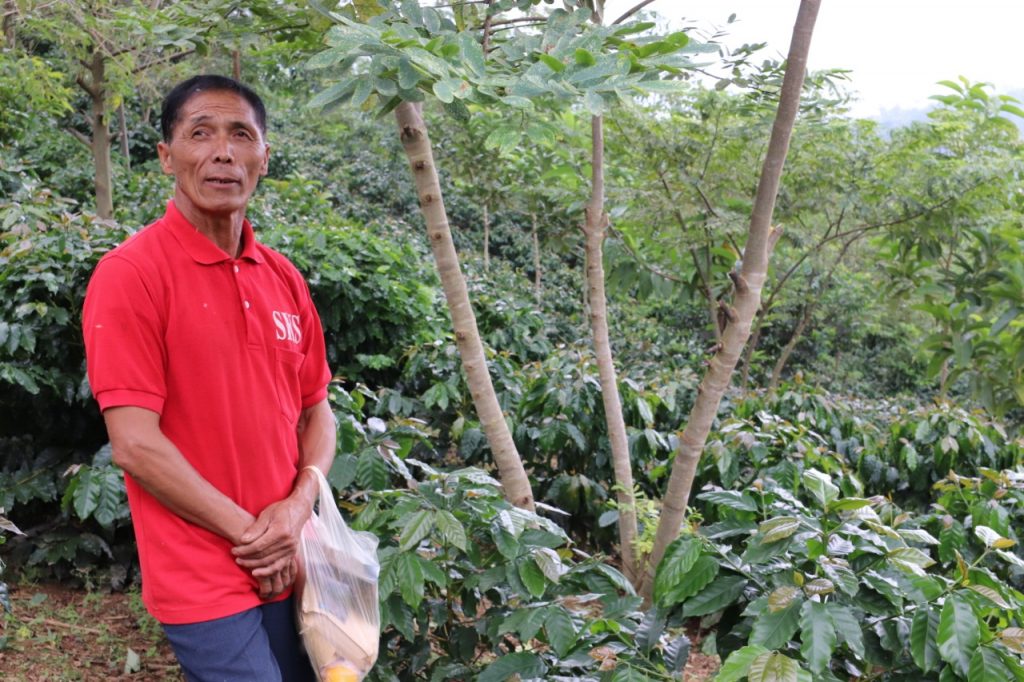Mr. Bounsee
Meet Mr. Bounsee: Ex-Policeman and Village Chief
His Story
1.
Opium cultivation made my father a slave. At home, it was the only way for my family to make an income. But I was lucky that my path was much different from his. My grandfather was deputy of the provincial police and he persuaded me to become a police officer. In the early days, I was a guard in the detention unit. I later moved to the Department of Citizenship where I made a census book and issued ID cards.
I enjoyed working with the police force. However, my time there did not last long. My father was suffering from the effects of drug addiction. He had trouble breathing and he experienced pain, dizziness and weakness. His symptoms were similar to those of tuberculosis. He could not move and there was no one to get food for him. His deteriorating health made me the pillar of the family. After five years, I decided to resign from my commander post and work with the NamEin village police force so that I could be closer to home and look after my family. He kept getting worse so eventually I decided to leave the village police force and come home. After 22 years, my father passed away. Because of my family’s faith in my father, I was given the position of village chief.
2.
Opium cultivation started to become harder to do. The government issued a ban on growing opium so trade became difficult and prices kept falling. In 2003, as village chief, I decided to lead the ending of opium cultivation in my village according to the Party’s policy. However, I found it hard to be a role model for others in my village. There was a major boost in support from the government for the commercialization of upland rice cultivation, but growing rice led to the degradation of land because the plots had to be moved every year. Corn was also problematic because of fluctuating prices. The government also provided support for poultry and pig raising and but we experienced disease outbreaks.
3.
The past has taught me to be a strong person. As one of the enthusiasts that encouraged the members of my village to focus on coffee, I have tried to set an example for other families through my techniques and perseverance in coffee growing. The start of the year marks our third year with coffee and we expect to be very productive next year. Growing coffee takes a lot of work and takes a long time to reach first harvest. Sometimes it is frustrating for my wife, and we worry about working with traders so far away. But we believe in the strength of working as cooperative with other coffee villages. And we are dedicated both physically and emotionally to producing quality coffee.
- 1.
- 2.
- 3.

Opium cultivation made my father a slave. At home, it was the only way for my family to make an income. But I was lucky that my path was much different from his. My grandfather was deputy of the provincial police and he persuaded me to become a police officer. In the early days, I was a guard in the detention unit. I later moved to the Department of Citizenship where I made a census book and issued ID cards.
I enjoyed working with the police force. However, my time there did not last long. My father was suffering from the effects of drug addiction. He had trouble breathing and he experienced pain, dizziness and weakness. His symptoms were similar to those of tuberculosis. He could not move and there was no one to get food for him. His deteriorating health made me the pillar of the family. After five years, I decided to resign from my commander post and work with the NamEin village police force so that I could be closer to home and look after my family. He kept getting worse so eventually I decided to leave the village police force and come home. After 22 years, my father passed away. Because of my family’s faith in my father, I was given the position of village chief.

Opium cultivation started to become harder to do. The government issued a ban on growing opium so trade became difficult and prices kept falling. In 2003, as village chief, I decided to lead the ending of opium cultivation in my village according to the Party’s policy. However, I found it hard to be a role model for others in my village. There was a major boost in support from the government for the commercialization of upland rice cultivation, but growing rice led to the degradation of land because the plots had to be moved every year. Corn was also problematic because of fluctuating prices. The government also provided support for poultry and pig raising and but we experienced disease outbreaks.

The past has taught me to be a strong person. As one of the enthusiasts that encouraged the members of my village to focus on coffee, I have tried to set an example for other families through my techniques and perseverance in coffee growing. The start of the year marks our third year with coffee and we expect to be very productive next year. Growing coffee takes a lot of work and takes a long time to reach first harvest. Sometimes it is frustrating for my wife, and we worry about working with traders so far away. But we believe in the strength of working as cooperative with other coffee villages. And we are dedicated both physically and emotionally to producing quality coffee.

